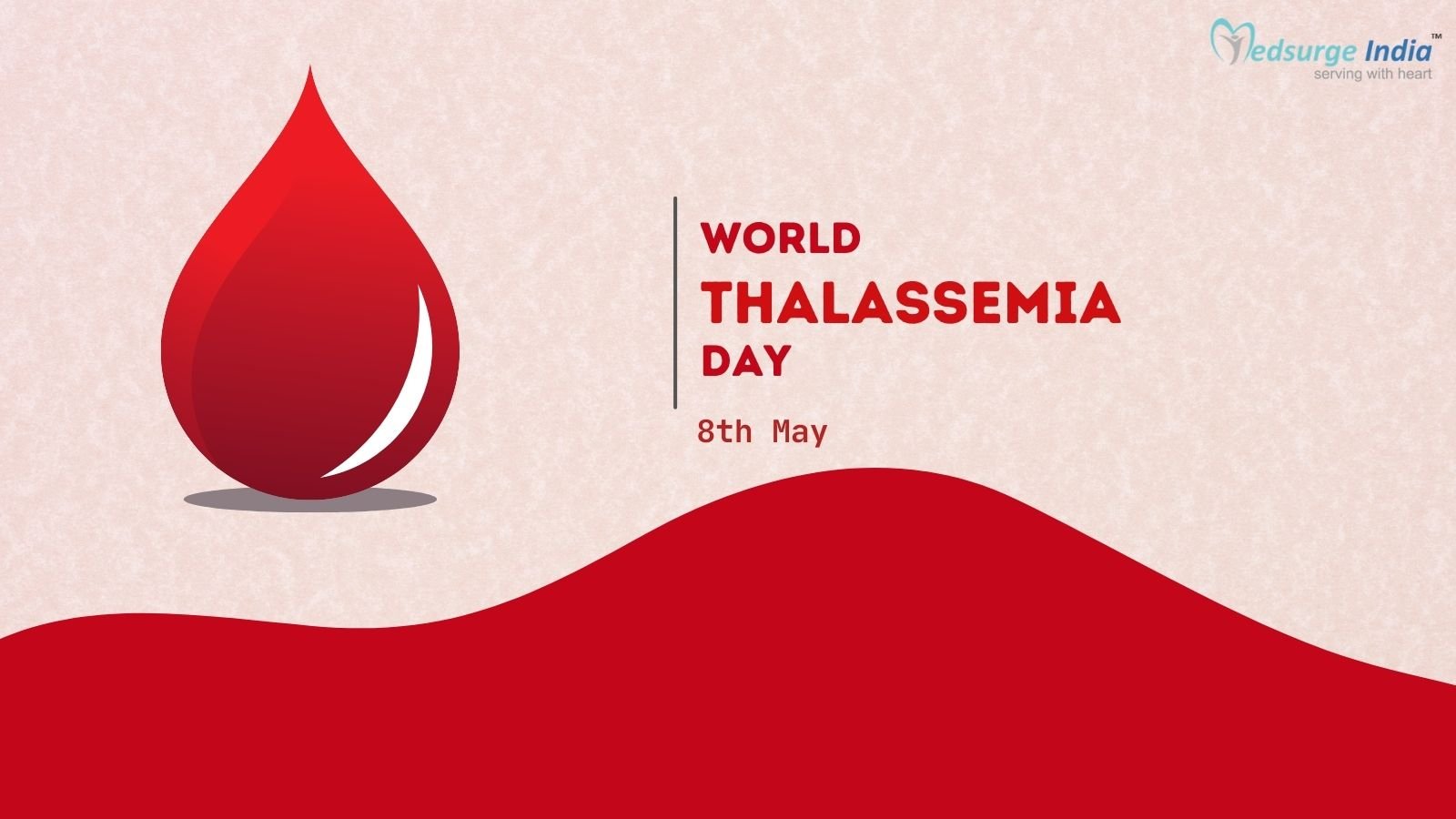
World Thalassemia Day 2023 – Medsurge India
The 8th of May is World Thalassaemia Day, a special day dedicated to raise awareness of a genetic condition known as ‘Thalassaemia’. Thalassaemia is a genetic disorder in which the oxygen-carrying proteins in the blood, commonly known as hemoglobin, and red blood cells are reduced. This results in fatigue, weakness, and slow physical development. While moderate cases may not require treatment, severe cases might require blood transfusions or donor stem-cell transplants. To develop treatment choices, it becomes essential to understand the disease, how it is inherited, and how it affects the body. To create more awareness regarding the disorder, World Thalassaemia Day is celebrated every year.
Theme of World Thalassaemia Day
The theme for this year’s International Thalassaemia Day is ‘Strengthening Education to Bridge the Thalassaemia Care Gap.’ The theme aims to improve individuals’ understanding and expertise of the disease, with the goal of reducing the gap in thalassaemia care. The primary focus is on developing patients’ abilities and knowledge so that they may take charge of their health and manage their condition more efficiently.
About Thalassemia
Thalassaemia is a genetic blood condition that affects the production of hemoglobin, the protein in the blood that transports oxygen. Hemoglobin is composed of two proteins: alpha and beta globin. Thalassaemia is caused by a mutation in one or both of the genes that produce alpha or beta globin, resulting in diminished or insufficient production of one or both types of globin. This causes a deficiency of hemoglobin, resulting in anemia along with other consequences.
Thalassaemia is classified into two types: Alpha Thalassaemia and Beta Thalassaemia.
- Alpha Thalassaemia arises when there is an issue with the alpha globin gene, leading to decreased alpha globin production.
- Beta Thalassaemia, on the other hand, arises when there is an issue with the beta globin gene, resulting in low or insufficient beta globin production.
Thalassaemia is more prevalent in Mediterranean, Middle Eastern, and Southeast Asian communities. Thalassaemia currently has no cure, although treatment options include blood transfusions, bone marrow transplants, and gene therapy. Early detection and care of Thalassaemia is essential for improving the quality of life of those affected.
Prevention of Thalassemia
Although thalassemia cannot be prevented, only the measures listed below may reduce the risk of thalassemia in newborns.
- Parental genetic testing for thalassemia gene presence
- Prenatal testing
- Preimplantation genetic testing
- Provision of public awareness and education about thalassemia
Birth of Thalassaemia Major children can only be avoided if the parents’ thalassemia status is known prior to conceiving. If both parents test positive for the carrier state, they should be counseled about prenatal diagnosis throughout the first trimester of pregnancy to determine whether or not the index fetus is affected. If the couple experiences harm, medical termination is recommended
Treatment of Thalassemia
The specific type of treatment a person receives is determined by the degree of severity of their thalassemia. The more severe the thalassemia, the less hemoglobin the body contains, and the greater the risk of anemia.
For moderate and severe thalassemia, doctors make use of one of three traditional treatments:
- Blood transfusions: Red blood cell transfusions are the major treatment for individuals with moderate or severe thalassemias. The treatment restores normal hemoglobin levels in your red blood cells.
- Iron chelation therapy: Hemoglobin is an iron-rich protein found in red blood cells. Thus, regular blood transfusions might cause an iron accumulation in the blood. This is known as iron overload. It harms the liver, heart, and other organs. Doctors make use of iron chelation therapy to remove excess iron from the body to prevent this damage.
- Folic acid supplements: Folic acid is a B vitamin which helps in the formation of healthy red blood cells. In addition to blood transfusions and/or iron chelation therapy, your doctor may advise you to take folic acid supplements.
- Bone Marrow Transplant: A stem cell transplant replaces defective stem cells with healthy stem cells from another person (a donor). Stem cells are bone marrow cells that produce red blood cells and other types of blood cells. The only treatment that can cure thalassemia is a Bone Marrow Transplant in India. However, only a small number of individuals with severe thalassemias are able to find a favorable donor match and have the risky procedure.
Significance of Thalassemia Day
World Thalassaemia Day holds significant importance because it is dedicated to raising awareness of Thalassaemia, a genetic blood condition. The day is intended for educating people about the disease, its causes, and symptoms, as well as to encourage individuals to adopt healthy lifestyles that can help prevent the beginning of Thalassaemia. The day is especially significant in emphasizing the challenges that people with Thalassaemia come across and focusing on the importance of providing them with appropriate care and support. Furthermore, World Thalassaemia Day aims to remind society of the need for ongoing research and development in the field of Thalassaemia treatment and management.





